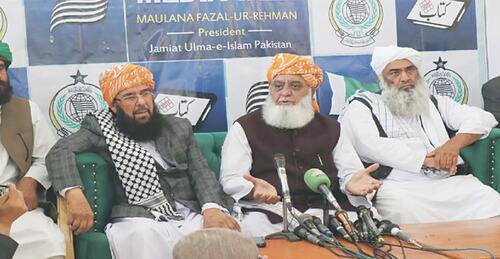KARACHI: It appears that Asif Ali Zardari is not as popular among his supporters as he was when he was first elected president in 2008. JUI-F has decided not to cast a ballot in the presidential election, and MQM-P has stated that they will make their demands known should the PPP ask them to do so.
At a news conference in Karachi on Sunday, JUI-F Chief Maulana Fazlur Rehman said that his party would not participate in the presidential elections. He also informed all ruling alliance politicians who had lately approached him about this position.
When asked about the chances of the upcoming presidential election, he stated that he was supporting Mehmood Khan Achakzai, the opposition candidate, rather than Mr. Zardari, the PPP candidate, but he made it clear that this was “a personal wish” and not the party’s position.
Maulana declared, “I want to vote for Achakzai Sb [in the presidential election] personally.” However, this is my desire and not the party’s choice. It is irrelevant if the party chooses to abstain from voting based on my desire. The party’s choice takes precedence over individual desires.
Fazl says that Achakzai is his “personal preference” over Zardari, while Farooq Sattar asks questions about “misuse of funds.”
The head of JUI-F, dashbaz Sharif’s ruling alliance, dashed hopes for the coalition when he denied any chance of sitting on the Treasury benches and insisted on being a member of the opposition in the legislature, hinting at the beginning of a “countrywide protest campaign” against the “rigged” elections.
Reiterating his position regarding the elections scheduled for February 8, he charged that the Pakistani people’s mandate was being “stolen and managed” by the establishment, claiming that they were deceived in 2024 just as they had been in 2018.
In response to a query concerning the outcomes of his most recent talks with the leaders of the parties that comprise the ruling coalition, he said, “Our friends [the leaders of the PML-N and PPP] approached us and held meetings.”
“We addressed them, showed them the respect they deserved, and presented our argument. They will undoubtedly be persuaded by now and won’t approach us [to join the government] in the future. There should be no question about the fact that we would be seated on the opposition benches in the legislature.
He called the elections on February 8th “rigged and controversial” overall, but he singled out the provincial assembly in Sindh and Balochistan, where the mandate was “bought” with enormous financial outlays. The PPP, which became the dominant party in both provinces, has just succeeded in electing its nominees to serve as chief ministers and forming governments.
When asked about his thoughts on the elections in other provinces, Maulana responded, “This doesn’t mean that we are satisfied with the election results in KP or other parts of the country.” “The establishment devised a bizarre scheme that distributed mandates independently of the wishes and votes of the populace. We lost the elections because we opposed this strategy and refused to participate in the sale-purchase scheme.
In response to a query concerning the potential for a “grand alliance” of opposition parties within the legislature, the head of JUI-F stated that it would be premature to propose any such coalition anytime soon.
Maulana was certain that in addition to “local elements,” there were “international factors” that contributed to his party’s failure in the most recent elections and infuriated “foreign powers” against JUI-F.
“It is inconceivable to overlook the involvement of global powers [in the elections], who were evidently displeased with my encounters with Hamas leaders to demonstrate support for the Palestinian people and denounce Israeli crimes,” he uttered.
“I then had a meeting with the leaders of Afghanistan, where the Islamic Emirate has taken power and the US has suffered a humiliating loss. Even if the goal of my discussions with Afghan leaders was to improve relations between the two nations and promote regional peace, the foreign powers didn’t think well of it. Thus, they applied pressure to our establishment, and the election results followed.
MQM-P to current requirements
Separately, prominent MQM-P leader Dr. Farooq Sattar declared that no talks on the impending presidential elections have taken place with the Pakistan Peoples Party (PPP).
Speaking to the media, Dr. Sattar stated that “we are not against them and our doors are open” if the PPP is interested in holding discussions.
He emphasized that MQM-P will make their demands known and look for solutions if they do get in touch.
In light of the apparent misappropriation of billions of rupees received in the budget, he emphasized the importance of finding answers.
He declared, “We will look for answers regarding their actions toward the MQM-P and the people of Sindh, especially with regard to the distribution and use of budgetary funds.”
He added MQM-P would like to be informed of Mr. Zardari’s future intentions.
“We would like to know how Mr. Zardari, in his capacity as president, would promote harmony among the various factions that exist within the provinces.”








